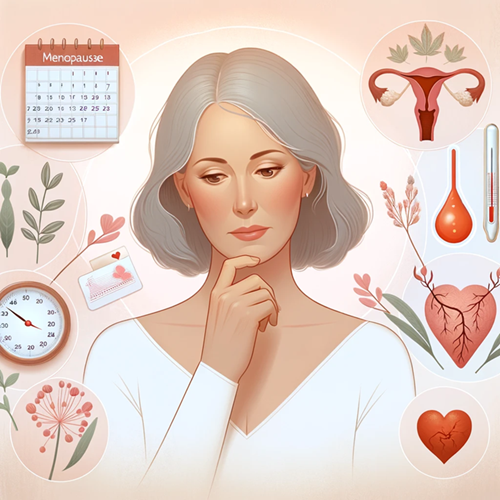Holistic Approaches to Menopause Management

Menopause, a natural phase in a woman’s life, often brings with it a variety of physical and emotional symptoms ranging from hot flashes and sleep disturbances to mood swings and anxiety. Managing these symptoms holistically can enhance well-being without relying solely on medication.
Dietary Adjustments
Importance of Phytoestrogens
Phytoestrogens are plant-based compounds that mimic estrogen in the body. Foods rich in phytoestrogens, such as soy products, flaxseeds, and sesame seeds, can help balance hormone levels naturally. Incorporating these foods into the diet can alleviate some of the most persistent menopausal symptoms, such as hot flashes and vaginal dryness.
Balancing Macronutrients
Proper balance of macronutrients—carbohydrates, proteins, and fats—is crucial. High-fiber, whole-grain carbohydrates can stabilize blood sugar levels, while adequate protein intake supports muscle mass, which tends to decline with age. Healthy fats, especially omega-3 fatty acids found in fish like salmon and sardines, are beneficial for cardiovascular health and cognitive function, which can be adversely affected during menopause.
Reducing Trigger Foods
Certain foods and substances can exacerbate menopausal symptoms. Caffeine and spicy foods might trigger hot flashes in some women, while alcohol and sugary foods can contribute to mood swings and weight gain. Reducing or eliminating these triggers can significantly improve quality of life during menopause.
Hydration and Calcium Intake
Staying hydrated is essential, as water helps manage menopausal bloating and aids in digestion. Additionally, increasing calcium intake through dairy or fortified alternatives is critical to counter bone density loss, a common issue post-menopause.
Physical Activity
Cardiovascular Health
Regular aerobic exercises such as brisk walking, cycling, or swimming improve cardiovascular health, which is crucial as the risk of heart diseases increases after menopause due to hormonal changes.
Weight Management
Physical activity helps in maintaining a healthy weight. Weight gain is common during menopause due to a slower metabolism, changes in hormone levels, and decreased muscle mass. Exercises like strength training can increase muscle mass, thus boosting the metabolic rate.
Bone Density
Weight-bearing and resistance exercises such as weight lifting, yoga, and Pilates can strengthen bones and improve posture. This is particularly important during menopause, as the decrease in estrogen levels can lead to bone density loss, increasing the risk of osteoporosis.
Mental Health and Mood
Exercise releases endorphins, the body’s natural mood lifters. Regular physical activity can alleviate symptoms of depression and anxiety, which are often reported during menopause.
Sleep Quality
Many women experience sleep disturbances during menopause. Engaging in regular physical activity can help improve the quality of sleep by reducing stress and anxiety levels and normalizing sleep patterns.
Mindfulness and Relaxation Techniques
Mindfulness Meditation
Mindfulness meditation involves focusing on the present moment and observing thoughts and sensations without judgment. This practice can reduce the stress and anxiety associated with menopause, promoting a sense of calm and helping to manage mood swings.
Deep Breathing Exercises
Deep breathing is a simple yet effective relaxation technique that can be used to combat moments of anxiety or stress. Techniques like diaphragmatic breathing encourage full oxygen exchange and can help reduce the intensity of hot flashes and stabilize mood.
Progressive Muscle Relaxation (PMR)
PMR involves tensing and then relaxing different muscle groups in the body. This process can alleviate physical tension and stress, leading to improved sleep patterns and reduced pain associated with menopause, such as headaches or muscle stiffness.
Yoga and Tai Chi
Yoga and Tai Chi are not only physical activities but also deeply meditative practices. They combine physical movement with breath control and meditation, aiding in stress reduction, improving flexibility, and strengthening muscles, which can be particularly beneficial during the menopausal transition.
Herbal Remedies and Supplements
Black Cohosh
Black cohosh is widely used for treating hot flashes and night sweats. It acts as a natural estrogen, helping to balance hormone levels without the side effects associated with synthetic treatments.
Red Clover
Red clover contains isoflavones, plant-based chemicals that mimic estrogen in the body. This herb can help alleviate menopausal symptoms such as hot flashes, bone density loss, and cardiovascular risks.
Evening Primrose Oil
Rich in gamma-linolenic acid, evening primrose oil is beneficial for managing hormonal fluctuations and reducing symptoms like hot flashes and sleep disturbances.
St. John’s Wort
Primarily known for its antidepressant effects, St. John’s Wort can be particularly effective in treating menopausal mood swings and depression.
Vitamin E
Supplementing with vitamin E is thought to help reduce the severity of hot flashes. It’s also important for skin health, which can be compromised during menopause due to hormonal changes.
Social and Emotional Support
Emotional Well-being
The emotional fluctuations that accompany menopause can be mitigated through strong social networks. Sharing experiences with friends, family, or support groups can alleviate feelings of isolation and provide reassurance.
Psychological Health
Support groups or counselling can be particularly beneficial. They offer a space to discuss feelings openly, providing coping strategies and reducing the likelihood of depression linked to menopausal changes.
Lifestyle Motivation
Being part of a community can motivate one to maintain healthy habits. Group activities, whether exercise or social outings, encourage positive lifestyle changes that are crucial during menopause.
Conclusion
Embracing a holistic approach to menopause management involves integrating physical, dietary, and psychological strategies to address the myriad symptoms associated with this transition. By focusing on natural treatments and lifestyle modifications, women can achieve a greater sense of control and well-being during menopause.
I'm a fully qualified Beautician and a practitioner of Non-Surgical Cosmetic Procedures. Having worked in the beauty industry since 2011 I have gained a lot of experience and gone on to become a published expert in a wide range of matters concerning health, beauty and nutrition.



